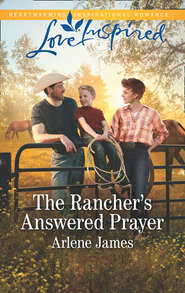По всем вопросам обращайтесь на: info@litportal.ru
(©) 2003-2025.
✖
A Bride To Honor
Автор
Год написания книги
2018
Настройки чтения
Размер шрифта
Высота строк
Поля
Her mouth was hanging open. She couldn’t help it. Unless she’d lost her mind, which was a distinct possibility, he was actually flirting with her. Her! Cassidy Jane Penno. “Uh, yab, dun, er...”
He just laughed and chucked her under the chin, then abruptly checked his watch. “Gosh, I have to go.” He pointed a finger at her. “Thursday. One o’clock. I’ll take care of lunch. Right?”
“Ah, erp, sure!”
“Great!” He flashed her a wink and backed toward the door, turning, finally, to hurry from the room.
Astonished, Cassidy flung an arm over the rolling rack. Then slowly her face crumpled. “Such a brilliant conversationalist, Miss Penno,” she mocked in a nasal voice. “No wonder your brother doesn’t trust you further than he can throw you backward through a hoop. Holy cow.” She smacked herself in the forehead with the heel of her hand. First the glop and then the ers and duhs. And she had to have designs by Thursday! Thursday lunch!
Lunch with Paul Spencer. Holy cow!
Absently Paul tapped in the code that unlocked the driver’s door of his sleek black Jaguar and slid beneath the wheel. Whatever had possessed him to insist on a luncheon date with Cassidy Penno? She was an engaging young woman, quite lovely even if she didn’t know it—and he rather liked that she didn’t—and fun in a way he hadn’t encountered in a very long time. Her creativity and her wholesomeness were refreshing. None of that changed the fact that he was practically engaged to Betina. Practically but not quite, damn her.
Now, now, he chided himself, as he started up the engine and put the sleek auto in motion, that’s no way to think about your future wife.
He was resolved, as his grandfather must have known he would eventually be, to making his stepcousin his wife. It was the only thing to do, really, considering that the scheming old man had left her thirty percent of Barclay Bakeries, the very same as he’d left Paul himself. Paul, of course, had another ten percent to go with his thirty, leaving thirty percent to be divided among other family members. His uncle Carl and his wife, Jewel, who was Betina’s mother had ten. And so did his uncle John, who had never married, ten percent had gone to his deceased uncle’s wife, Mary, and her daughter Joyce, who was now Joyce Spencer Thomas.
No nonfamily member had ever owned a share of the business, not since Paul’s great-grandfather had founded it. Customarily, the spouses and children of family members shared in that member’s legacy. However, both Paul’s great-grandfather and grandfather had reserved huge majorities for themselves. The majority of the family had declined involvement in the business, content to pull in their financial rewards without bothering with the nasty details of enterprise.
Paul was the exception. He had a fine mind for business and a great desire to use it, and when he had ascended to the position of CEO upon his grandfather’s retirement, he had foolishly assumed that eventually his grandfather’s sixty percent majority would be added to the ten percent he had inherited from his own parents. Family tradition demanded it. The family themselves expected it, knowing that Paul could be trusted to guide the business with the same skill and dedication as his predecessors. Then the old man had thrown him a curve.
In truth, Paul partly blamed himself. He’d known for some time that his grandfather was concerned about his unmarried status. At thirty-eight, Paul was well past the age when most men married for the first time, but it wasn’t for lack of interest. He just hadn’t found the right woman. Perhaps she didn’t really exist, this woman of his dreams—not that he could even assign her specific characteristics. He only knew that none of the many women with whom he’d involved himself had inspired in him the desire to be joined with her for life. Not even Betina.
He should never have allowed himself to be seduced by her. On the other hand, how many healthy, unattached men could resist a beautiful woman who walked into his office unannounced wearing nothing more than a hot pink raincoat belted at the waist, thigh-high stockings and three-inch heels? No, he couldn’t be blamed for submitting to temptation, even if temptation’s body had been surgically enhanced by the best plastic surgeons available. His true mistake had been in assuming that it was all in fun, and that the family at large would not assign significant expectations to what ought to have been private fun and games.
He couldn’t prove that Betina had let the family in on what she had promised would be their secret, but he wouldn’t put it past her. When he had realized that the family was ignoring his often-repeated assertion that his relationship with Betina was “casual,” he had taken steps to put an end to the fun and games as well as the expectations. Privately Betina had expressed her perfect understanding of the situation. Publicly she had spent months dabbing unseen tears from her eyes every time he entered the room where she was or, apparently, his name was even mentioned. Paul found himself in the unpleasant position of having to reveal how the affair had started or enduring and hoping it would all eventually blow over. He’d thought it had blown over.
Oh, he was aware that much discussion had been devoted to the “suitability” of the pairing by the family at large, and on the surface it did seem perfect. Betina had been twelve when her mother had married Uncle Carl. Sixteen years later she was very much a part of the family fabric without actually being a member of the family, especially as Carl and Jewel had had no children of their own. Having her married to a bona fide member of the family must have seemed somehow poetic and his own lack of enthusiasm foolish if not downright mean-spirited. On the surface Betina was the perfect woman—lovely, accomplished, graceful, sophisticated, warm—but only on the surface. Beneath the polished exterior, so far as Paul could tell, was only a vast amount of ambition and a cold sort of intelligence. Unfortunately he could not say as much to anyone else in the family, except perhaps Joyce. But what good would that do? Joyce was happily married to the plant manager of the business, the bakery itself, and busy trying to conceive a much-wanted first child.
If only he had explained in detail to his grandfather the reasons for and extent of the affair, as well as his objections to Betina herself as a wife, he might have spared himself and the whole family their concerns. But he had played the gentleman—after playing the stud—and now he would pay for the privilege. He had no choice. The family depended on him, and Betina had revealed an alarming desire to meddle in business affairs. Worse, when thwarted, she had threatened to involve the family in the fight, and that Paul could not allow. He had pledged, literally, to protect the family from any unwanted involvement in the affairs of the company when he had ascended to the position of CEO, and this sort of drama was just what they feared most. And Betina had to know it. So, despite months of looking for a way out, he was now resigned to what he had to do. The problem was that he had to do it before Betina’s new marketing scheme could be put into effect.
Disaster loomed on the horizon, especially as Betina had chosen this particular moment, when Barclay Bakeries was poised to expand into a national market, to bully him into adopting the most ludicrous marketing gambit ever devised. She wanted every slice of Barclay bread to be “embossed” with the image of Barclay’s logo, the portrait of the fictional Mrs. Barclay stamped in bread dough. The expense would be exorbitant and the result ridiculous, but he had agreed, while throwing up every roadblock to implementation imaginable, to keep the family from being drawn into the fight. And he had, reluctantly, proposed marriage.
But Betina wanted her pound of flesh. She seemed determined to lead him a merry chase, to make him appear the besotted fool in front of the family. That was what this stupid costume party was really about. It had nothing to do, as she claimed, with keeping the business in the news. It was all an exercise in bringing him to heel. Well, he had a few tricks up his sleeve himself. And that was where Cassidy Penno came into the picture.
Which in no way explained why he’d felt compelled to make a date out of what should have been a bothersome business appointment. Now was not the time to be taking interest in another female. Nothing whatsoever could come of it. On the other hand, why shouldn’t he enjoy himself if he could? Why should he give Betina the power to make him miserable? He would just make sure that Cassidy understood the situation. They were business associates who had the potential to become casual friends. That being the case, they were allowed to enjoy each other’s company as long as they didn’t get too personal. He could use a friend, and something told him that Cassidy could, too. But then, who couldn’t?
So lunch was going to be a fun thing, nothing more, and he’d come up with a fun menu for it. He was enjoying himself just considering the possibilities. Almost-engaged men deserved to enjoy themselves. Even married men were allowed a bit of fun. Even men married to Betina Lincoln. Especially men married to Betina Lincoln, unless he missed his guess. And he was very much afraid that he didn’t. Very much afraid.
Chapter Two
Cassidy chewed the inside of her cheek as she watched the caterers descend on her shop. They busily arranged a portable table covered by a sparkling white Damask tablecloth. She felt worried, thrilled and nervous all at once. Lunch, he’d said. It looked like a feast: fruit salad, an incredibly delicious-smelling beef Bourguignonne, crusty French bread; brie; wine; and for later, a chocolate gateau and whipped cream; all served by a uniformed waiter with a secretive smile. Cassidy smiled nervously in reply.
What could Paul Spencer be thinking? She was his costumer, sister to one of his employees, and nothing more. Yet he was treating her like a date, like someone in whom he was interested romantically. She wondered guiltily if William knew, and if not, should she tell him. Before she could come to any conclusion about that, Paul Spencer rushed into the room, speaking into a small cell phone.
“Yes, Gladys, I understand. Nevertheless, I am turning off the phone now, and I will not turn it on again until—” he checked his wristwatch “—two-oh-five.” With that he punched a button, folded the phone into a palm-sized rectangle and dropped it into his jacket pocket, his gaze searching out Cassidy. When he spotted her, standing across the room beneath an artificial tree outlined with tiny white lights next to a gypsy caravan wagon and a campfire created with colored lights and fake logs, he smiled brightly.
Cassidy stepped forward, dismayed by the thrill she felt at seeing him again. She was making much too much of this, she told herself sternly. Paul Spencer was just a businessman doing what he deemed necessary to secure the service he needed. After all, it was the busy season for her, and she was doing him a favor because of his connection with William. He probably wined and dined all his business associates this way. She was probably the only one who fervently wished that he didn’t. That in mind, she blurted, “You shouldn’t have gone to all this trouble.”
“No trouble,” he said lightly. Then his gaze fell over the small, portable table carried in by the caterer, and he approached, rubbing his hands together with a smack of approval. “Looks good, and it isn’t just because I’m starved.”
Obviously pleased, the waiter immediately hurried around the table and pulled out a chair, waving Cassidy toward it. Selfconsciously, she stepped over the artificial campfire, knocking only one log out of place. Then she slid into the chair, with only a small bump against the corner of the table, resulting in shaking to the floor only a single salad fork, which the waiter snatched up and polished to cleanliness with a white cloth before carefully and reverently placing it once more next to its neighbor. Cassidy sat red-faced while the waiter performed the same courtesy with the chair for Paul Spencer, but without the slightest mishap. Paul settled himself and smiled across the table at her.
“I half expected to find you outfitted in green guacamole or some such.”
The color of her face intensified. “Oh, no, I wouldn’t wear a costume to lunch.”
“Not even a costume lunch?”
His teasing relaxed her a bit, and she said, “I’ve never heard of a costume lunch.”
“Well, we’ll have to introduce it, make it the next big fad. Ought to be quite a boon for business.” A grin quirked around the corners of his mouth, and Cassidy found herself laughing. “That’s better,” he said, leaning both elbows upon the table while the waiter fluttered about, lifting covers and spooning out portions.
Cassidy felt an acute shyness. No matter what she told herself, it felt as if she was being courted. But what would be the point in that? She had already agreed to help him with his costume. More important, the man was almost engaged to be married. Even if he wasn’t, she couldn’t quite imagine why he’d be interested in her. She was just a costumer and William Penno’s younger, rather plain, sister. That in mind, she fixed her thoughts on business.
“Would you like to see my designs now?” she asked uncertainly, leaning back in her chair to allow the waiter to spread her napkin.
Paul waved a hand. “I’m too hungry to do anything just now but eat—and look at you.”
“Oh.” She resisted the urge to smooth her hair, knowing that it hung straight as a board right to the ends. After a moment she picked up her fork and began to eat her colorful fruit salad.
“Did you have a difficult time with it?” Paul asked, halfway through his salad already. “The design, I mean.”
She put down her fork and dabbed her mouth with her napkin. “No, actually, I didn’t. You’re quite easy to imagine in costume.”
“Is that good?” he asked, sounding hopeful.
She tried to find the words to explain, seeing in her mind’s eye the way she’d pictured him during the course of her research. “Yes. You see, usually I picture characters in my costumes, and then somehow they don’t look quite right on real people. Not to me, anyway.”
“And you think I’ll look the part?”
“Somehow I do.” It was odd, really, but she’d been picturing him in quite a lot of costumes lately, and he’d looked splendid in them all—at least in her mind’s eye. She shook her head.
“I imagine I will, then,” he said, and she was aware of a tingling sense of pleasure at the soft words. He trusted her judgment. It shouldn’t have pleased her so. It should have pleased William, though. The thought of anything she might do actually pleasing her rather uptight brother made her laugh, and Paul Spencer put down his fork, smiling as if he enjoyed the sound. “Why is it you lift my spirits?” he asked, parking his chin on his upraised palm.
“Me?” she heard herself say flirtatiously, and he smiled at her a long moment before picking up his fork again.
It was the most wonderful lunch of her life, and she told him so afterward.
“I wanted to do something special,” he confessed, looking deeply into her eyes. She had the feeling that if Tony hadn’t popped in just then, dressed as Charlie Chaplin, Paul would have kissed her, but then she was probably imagining things. They had a table between them, after all, even if it was a small table. The waiter had disappeared with the remains of their meal. Tony didn’t bother with ceremony.
“Phone call for Mr. Spencer.”
The intent look disappeared from Paul’s face, replaced in swift sequence by irritation, disappointment and, finally, resignation. “I don’t suppose you got a name?”
Tony’s smile was somehow galling. “I didn’t ask. It’s a woman, though, if that helps.”
A muscle ticked in the hollow of Paul’s cheek. He rose to his feet, speaking apologetically to Cassidy. “I’m sorry, but I’d better take it.”











